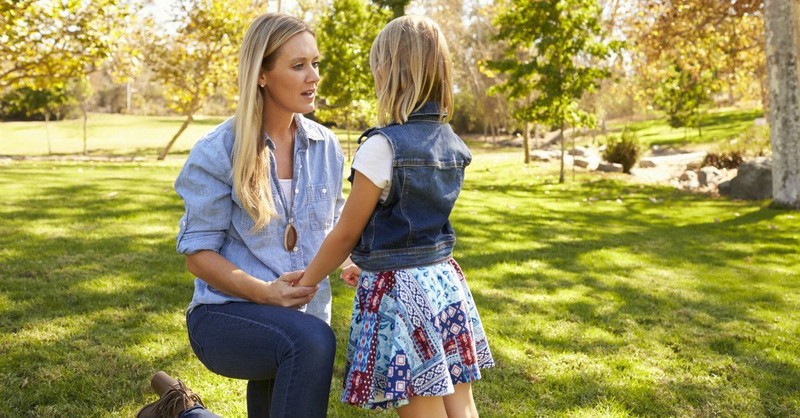
Though a certain degree of concern for the things of life is normal and healthy, there are many anxiety disorders that adversely affect children. It’s sometimes difficult to determine when our kids require more attention and treatment than we are qualified to give. Prayer is a powerful tool for seeking answers and encouragement, which often comes through a caring nurse, doctor, or counselor. The following insights can guide parents in their everyday struggles with their children’s anxiety, but should not replace the help of a qualified counselor or medical diagnosis.
Photo Credit: annie-spratt-unsplash

1. Pray for Them
“Rejoice always, pray continually.” (1 Thessalonians 5:16-17)
Children benefit from parents who keep a rich prayer life. Pray ahead for children as they grow for God’s blessing on their friendships, for physical safety, and for the guarding of their hearts and minds as they grow in their own faith. Our place in their lives is to guide them to His feet. When they see us seek Him, especially in anxious moments, it sets a foundational example. They will tend to seek comfort as we do, especially when they are little. They look to us to learn how to navigate the anxious moments of life.
Praying with our children when they are worried and anxious may not always relax them immediately, but it’s a powerful lesson in acknowledging Who we get our strength from. Teaching them to pray independently is helpful, too.
Journaling may help elementary kids and tweens. Talking through prayers with toddlers is a good way to teach them to pray. Kids have lots of questions about the things that worry them. God welcomes all of their questions, as should we.
Photo Credit: Thinkstock/Sasiistock

2. Know Them
“Be shepherds of God’s flock that is under your care, watching over them—not because you must, but because you are willing, as God wants you to be; not pursuing dishonest gain, but eager to serve; not lording it over those entrusted to you, but being examples to the flock.” (1 Peter 5:2-3)
Sheep know their shepherd's voice. They follow Him and trust Him. Our children will learn to crave our voices in time if we prove to be available and interruptible for them. Listening, paying attention, and engaging with them are important building blocks in establishing a healthy and trusting relationship with our children.
Being truly known helps their anxiety and worry. They can feel loved for who they are, flaws and all. The sheep trust the shepherd because he has proven his love for them. We trust Jesus because He loves us fully, flaws and all.
Anxiety can vary in levels, carrying a stigma that is confusing for both adults and children to understand. Embracing them for who they are early on can help them cope.
Photo Credit: Pexels/Daria-Shevtsova

3. Observe Them
“Let love and faithfulness never leave you; bind them around your neck, write them on the tablet of your heart.” (Proverbs 3:3)
We have an opportunity to create a legacy for our children, stringing truths like beads of a necklace they will wear throughout life. Each child of God is different, possessing a uniqueness all their own. Parents can often separate generalized characteristics from something out of step in their child’s behavior.
There are many gifted counselors and doctors available to determine diagnosis, but our input is crucial. We are the closest witnesses to our children’s daily behavior.
Changes in what our children like or dislike, from favorite foods to favorite activities, could be signs of anxiety. Pains without medical explanation, anger or emotional outburst that are not typical of our children could also be signs. If something feels off, it probably is. When the fun routines of everyday life start to stress children out if they are not done right, anxiety may be lurking.
Photo Credit: ThinkstockPhotos-Qwasyx

4. Talk to Them
“So do not fear, for I am with you; do not be dismayed, for I am your God. I will strengthen you and help you; I will uphold you with my righteous right hand.” (Isaiah 41:10)
Listen and empathize with children, even from a very young age. Acknowledge that what they have to say matters. It’s worth the patience to listen, even when they are droning on about things we might not be interested in. It’s more than listening, though; it’s engaging in conversation. Ask questions and probe for more information. The value we place on their chatter matters to them.
The world can be a scary place, but God tells us not to fear. He’s put people in our lives and promised never to leave us alone. As parents, we are their model for family and community. It’s our job to point them to Christ. He listens to us, so we can listen to them. He talks to us and knows us, so we can talk to them and know them.
Photo Credit: ThinkstockPhotos

5. Take Them to a Counselor
“My people, hear my teaching; listen to the words of my mouth.” (Psalm 78:1)
One in eight children has an anxiety disorder. Twenty percent of the world’s population are Highly Sensitive People. Countless others struggle with depression. Without the proper diagnosis of counselors and mental health professionals, we may never know the whole story.
It’s important to take care of our minds in the same way we would take care of our physical bodies. Spiritually, daily prayer and time with God in His word will equip us to live life fully, but sometimes He uses the gifted people around us to heal and love us. It is important to make sure we are fully listening to the Lord, especially where our children are concerned.
The business of life and the puzzle pieces of well-meaning feedback concerning our children’s anxiety can quickly overwhelm us. Professional counselors can equip us with the knowledge and tools our children need to heal and grow.
Photo Credit: Thinkstock-Sasiistock

6. Face the Fear with Them
“Fathers, do not exasperate your children; instead, bring them up in the training and instruction of the Lord.” (Ephesians 6:4)
Instead of removing all the things they fear, learn to face them together. Some anxiety and worry is normal and needed. These feelings and perceptions teach us to fear things we should be afraid of: like traffic on a busy street, keeping a safe distance from fire, or not swimming in deep water without a life jacket. Take these natural fears and anxieties into consideration.
When my daughter is nervous before taking the stage solo, I reassure her that her body is getting ready to perform. I remind her to pray before she performs. Often, we pray together either before she goes backstage or on the way to the performance.
It becomes much harder to walk our children through anxious circumstances as they get older. However, calming our own anxiety and seeking to empathize with our children is more helpful than adding to it by letting our own fears get the best of us.
Photo Credit: Porapak-Apichodilok

7. Provide Stability
“Because of the Lord’s great love we are not consumed, for his compassion never fails. They are new every morning; great is your faithfulness.” (Lamentations 3:22-23)
God is faithful to provide for us and for our children. Remembering this allows us to relax into our roles as parents. A stable faith is a good foundation for fighting anxiety in our own lives and our children’s.
It’s also important to take care of our physical bodies: basic human needs like healthy meals, enough sleep, and staying hydrated. Keep up with check-ups to make sure their bodies are functioning well. Underlying conditions can cause the body to cope in many different ways.
We are created in God’s image to serve. Jesus came to serve, not to be served. We were put into communities and are encouraged to be a part of the local church. All of these things contribute to our overall physical, mental, and spiritual health. Making sure our basic human needs are met helps our children with their anxiety.
Photo Credit: unsplash/jeshoots-com

8. Foster an Environment of Forgiveness
“If we confess our sins, he is faithful and just and will forgive us our sins and purify us from all unrighteousness.” (1 John 1:9)
Forgiveness can free us and our children from the basic anxieties that plague our daily lives. Counselors are better suited to help us through anxieties that cannot be relieved simply by forgiving, and we should never continue to suffer at the hand of mental conditions that disable our natural ability to cope. Seek help from those gifted to help us work through and cure those conditions.
Forgiveness, however, is powerful. A lack of forgiveness is toxicity to the heart. We can teach our children to adopt good habits of forgiveness by practicing it daily. From a very young age, our apologies for losing patience will water good roots of forgiveness in our children. It helps them with feelings of anxiety that come from having to apologize or wishing for an apology that simply isn’t coming their way.
Photo Credit: Thinkstock-ijeab

9.Teach Them How to Cope
“Be strong and courageous. Do not be afraid or terrified because of them, for the Lord your God goes with you; he will never leave you nor forsake you.” (Deuteronomy 31:6)
Christ is always with us. He promises never to leave us. That can be a big concept for a child to fully embrace, especially in the face of anxiety. How can we, as parents, help them know the truth and cope daily with the worries and anxieties they face?
When asked where our strength comes from, or how our children can be strong, we can tell them about Jesus. But what about in the little moments when they are afraid to leave us, afraid to make new friends, afraid of lockdown drills at school, and the many threats to their safety they face daily?
Cover your children in prayer. Additionally, speak the truth directly to them. Give them reminders to carry with them, enabling them to cope well apart from us. Leave notes in their lunch boxes to remind them they are never alone. Teach them how to breathe deeply. Roll on essential oils they can smell throughout the day to feel calm. Build their relationships with trusted adults who will be present when we are not. The point of all of this is to take their eyes away from fear and bring them back to us, who point them to God.
For diagnosed anxiety disorders, medical professionals may prescribe medicine to help our children cope with their anxiety. Pray for God to reveal the right remedy for our children; one that will assure them they are loved by us, and their Heavenly Father. His wish is never for us to suffer.
Photo Credit: unsplash/jewelmitchell

10. Allow Them to Feel
“Do not be anxious about anything, but in every situation, by prayer and petition, with thanksgiving, present your requests to God. And the peace of God, which transcends all understanding, will guard your hearts and your minds in Christ Jesus.” (Philippians 4:6-7)
One of the worst things we can do as parents is to tell our children the way they are feeling is wrong. It piles on to the problem, giving them a new thing to worry about on top of their worries: “what is wrong with me?”
Every child of God is fearfully and wonderfully made, whether or not we are diagnosed with anxiety disorders or suffer from everyday fears and worries. If we, as parents, don’t have the answers for our children, we have not failed them. We are human. Life is full of unanswered questions and unexplainable circumstances.
Honoring all of our children's feelings allows them to feel our unconditional love. The world is full of unfair and unjust suffering. We don’t have to act like it’s not there, or that our children don’t see and feel the effects of it. Walking through it together, getting help when we need it, and keeping our eyes focused on Christ, helps us help our children through anxiety.
“Megs” writes about everyday life within the love of Christ. She stepped out of her comfort zone and her Marketing career, to obey God’s call to stay home and be “Mom” in 2011. From that step of obedience, her blog, Sunny&80, was born, a way to retain the funny, everyday moments of motherhood. Meg is also a freelance writer and author of “Friends with Everyone.” She loves leading her Monday morning Bible study, being a dance mom, distance running, and photography. Meg resides in Northern Ohio with her husband, two daughters, and Golden-Doodle … all avid Cleveland Browns fans.
Photo Credit: unsplash/gabby-orcutt
Originally published Friday, 22 March 2019.









